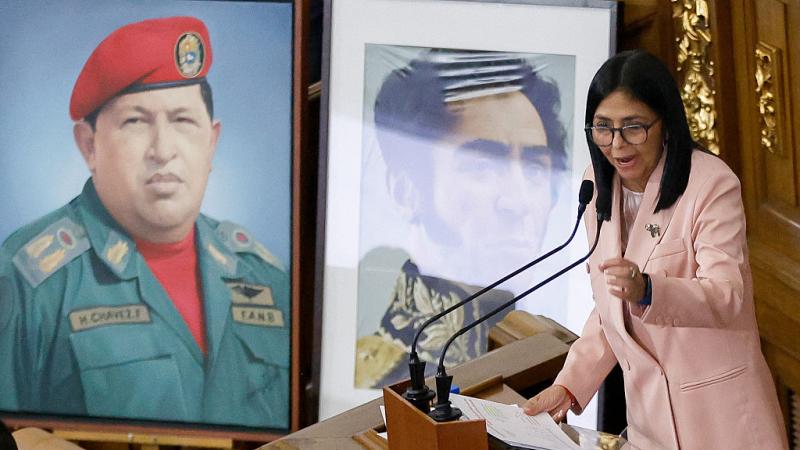Trump's global ambitions add pressure for quick Ukraine war deal
“I have my own deadline, and we want it to be fast,” Trump told reporters.
President Donald Trump has hinted that his self-imposed deadline for ending the Ukraine War is just a week away as he looks to wrap up American involvement in the conflict and lighten the load of an overstretched United States tied down in military and diplomatic initiatives in multiple other strategic theaters.
“I have my own deadline, and we want it to be fast,” Trump told reporters while meeting with Norwegian Prime Minister Jonas Gahr Store. “So we have a deadline and after that we have, we're going to have a very much different attitude, but I think it has a very good chance of getting done.” While Trump did not elaborate on that deadline, he appeared to signal it would soon pass by asking to defer a question on further Russian sanctions by one week.
“I'd rather answer that question in a week. I want to see if we can have a deal. No reason to answer it now, but I won't be happy. Let me put it that way, things will happen,” he said.
Trump’s comments came as he took a similar tone with the Iranian government amid nuclear talks. But those talks come as the U.S. conducts direct strikes on the Iranian-backed Houthi group in Yemen and supplies aid to Israel, whose military is in conflict with the Iranian-backed Hamas and Hezbollah in the Levant. Those efforts, and the American initiatives toward Russia, further coincide Trump’s efforts to secure lasting trade deals with nearly every nation in the world that have strained relations with key global allies.
While the administration has expressed considerable optimism about the resolution of each individual issue, the speedy resolution of the Ukraine conflict would certainly help to clear off Washington’s plate – especially that of Trump envoy Steve Witkoff – and establish the administration’s credibility in other negotiations.
Reprimanding Russia and Ukraine
Trump’s remarks on a deadline come as the president is livid with both Russian President Vladimir Putin and Ukrainian President Volodymyr Zelensky over their apparent eagerness to keep fighting despite his best efforts to broker a peace agreement. As senior U.S. officials increasingly warn that Washington is prepared to walk away from the conflict if Moscow and Kyiv don’t agree to a peace plan, Trump’s renewed public scoldings of the Eastern European leaders seem to point towards the effort floundering.
Though the president has stood by his assertion that the war would not have begun on his watch, he nonetheless tied himself to the conflict’s resolution through his campaign promise to end it within 24 hours and by holding high-profile diplomatic talks. Trump’s latest plea took a scolding tone in the wake of Russian missile strikes on Kyiv this week, with the president posting they were “not necessary and very bad timing.”
“Vladimir, STOP! 5000 soldiers a week are dying. Lets get the Peace Deal DONE!” Trump urged Putin. That appeal followed a similar scolding of Zelensky the day prior after the Ukrainian leader rejected American proposals to at least recognize Crimea as Russian territory. Trump called the statement from Zelensky “very harmful to the peace negotiations with Russia” and highlighted that control of the territory was not even part of the peace discussion. Russia annexed Crimea in 2014, following the ouster of pro-Russian Ukrainian President Viktor Yanukovych.
“It’s inflammatory statements like Zelenskyy’s that makes it so difficult to settle this War,” he added. “He has nothing to boast about! The situation for Ukraine is dire — He can have Peace or, he can fight for another three years before losing the whole Country.”
Walking away
Secretary of State Marco Rubio skipped a joint meeting with European leaders this week on Ukraine as Zelensky remained intransigent on concessions to Russia. The move followed his own warnings last week that the U.S. should “move on” if talks failed and set the timeline for doing so within “a matter of days.”
White House Crypto Czar David Sacks endorsed Rubio’s absence from the meeting in light of Zelensky’s Crimea statement. Himself a longtime critic of the Biden administration’s handling of the Ukraine conflict, Sacks further excoriated Zelensky for rejecting what he called the “easiest concession” in light of Russia’s de facto control over the region for more than a decade and the absence of a military way to reclaim the land.
During a trip to India this week, Vice President JD Vance stated that "[w]e've issued a very explicit proposal to both the Russians and the Ukrainians, and it's time for them to either say yes, or for the United States to walk away from this process.”
What “walking away” or “moving on” means is pretty much anyone’s guess at this stage, however. Trump indicated openness to sanctions on Russia and the U.S. adopting a “different attitude” toward Moscow, but did not commit to a tangible policy. After an Oval Office meeting with Zelensky last month turned sour, the administration briefly paused intelligence sharing with Ukraine in a period that saw the Russians reclaim a swath of territory in its own Kursk province that the Ukrainians invaded last year. Continued funding for Ukraine’s military remains unpopular with Trump’s Republican base and financial aid for Kyiv is not a major component of ongoing budget negotiations in Congress.
Other theaters
What is on the table for Congress is a heightened defense budget as years of supplying the Ukrainians and Israelis have emptied American stockpiles and renewed conflict with the Houthis in Yemen has Americans launching rockets and drones in a bid to halt the rebel group’s disruption of Red Sea shipping.
The Biden administration in 2024 launched a wave of strikes against the Houthis in January and February in the early months of the Israel-Gaza conflict, though the effort was largely unable to stop their harassment of Red Sea vessels and the Trump administration renewed the effort this year. Trump stated in late March that the Houthis had been “decimated” by the strikes, though the group remains active and operations are ongoing. Commercial vessels, meanwhile, are still largely opting for the longer route around the Cape of Good Hope.
The ongoing military operations against an Iranian proxy may add another layer of complexity to the nuclear talks with Tehran, moreover. The current administration has sought to avert armed conflict with Iran over its enrichment of Uranium and has expressed openness to allowing it to build a civil program by importing enriched materials.
But those talks remain in the relatively early stages and could be poised to last for months until a final resolution. As the effort largely seeks to prevent Iran’s development into a nuclear power, the negotiations will likely address other local geopolitical matters, such as Tehran’s attitude toward Israel and American positions in the Levant.
Irritated allies
During the Thursday meeting with the Norwegian prime minister, Trump and his European counterpart spoke favorably as to the prospect of an amicable resolution to the tariff dispute.
“We will definitely get along very well on trade. We'll do something. But I think the prime minister knows that over the years, the United States has been very good to a lot of people, and it's time for us to benefit also,” Trump told reporters. Store confirmed that the discussion had been positive and thanked Trump specifically for the “tone” of the conversation, which evidently contrasted starkly with the pointed rhetoric between Trump and European officials on trade that has dominated headlines.
Between Trump’s tariffs, which prompted strong condemnations from Europe, his perceived lenience toward Russia in the Ukraine conflict, and his criticisms of European contributions to collective defense, Europeans are increasingly questioning the status of the United States as a reliable ally.
A recent poll of European countries by Le Grand Continent and Cluster 17 reported in Politico found that 51% viewed Trump as an enemy of the European Union, with 43% further saying he “has authoritarian tendencies.” Seventy percent said the EU could only count on itself for defense, with just 10% insisting they could rely on America under Trump.
Tensions within the NATO bloc have long been present, especially over American irritation at the failure of European nations to meet their defense spending targets. But with America waging economic, military, and diplomatic efforts across the globe, an antagonized Europe could deprive Trump of potentially vital support elsewhere.














